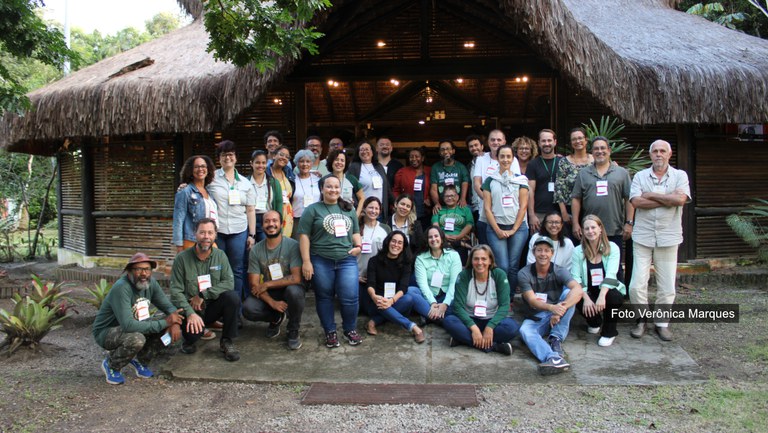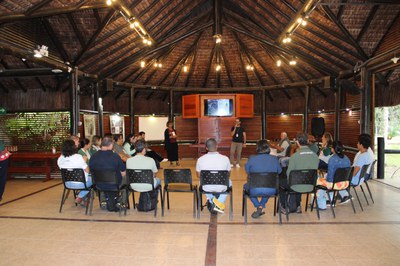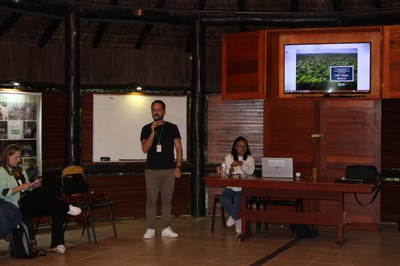Notícias
PAN Hileia Baiana takes stock of one year of its actions to conserve endangered trees

On August 6 and 7, the Rio de Janeiro Botanical Garden Research Institute (JBRJ), through the Center for Strategies for the Conservation of Endangered Flora (NuEC) of the National Center for Flora Conservation (CNCFlora), held the 1st Monitoring Workshop of the National Action Plan for the Conservation of Endangered Trees of Southern Bahia - PAN Hileia Baiana. The event, held at the RPPN Estação Veracel in Porto Seguro, Bahia, was supported by the Pro-Species Project: everyone against extinction and the RPPN Estação Veracel.
The main aim of the workshop was to monitor and evaluate the progress of the 31 conservation actions set out in the PAN. In addition, the obstacles faced were discussed and the necessary adjustments made to implement the established strategies. These workshops, held annually, are essential to ensure the success of the PAN.
The event brought together around 36 participants, including members of the Technical Advisory Group (GAT) and collaborators from various institutions, including universities, government bodies, companies and NGOs, such as Conservation International (CI-Brazil), the Bahia Forest Forum, the Chico Mendes Institute for Biodiversity Conservation (ICMBio) - Alto Cariri, Descobrimento, Monte Pascoal and Pau Brasil National Parks), the Federal Institute of Bahia (IF Baiano), Instituto do Meio Ambiente e Recursos Hídricos (INEMA-BA), Movimento de Defesa de Porto Seguro (MDPS), Programa Arboretum de Conservação e Restauração da Diversidade Florestal, Secretaria do Meio Ambiente do Estado da Bahia (SEMA-BA), RPPN Estação Veracel, RPPN Rio do Brasil, Universidade do Estado da Bahia (UNEB), Universidade Estadual de Santa Cruz (UESC), Universidade Federal do Sul da Bahia (UFSB), and the NuEC/CNCFlora/JBRJ team.
Marcio Verdi, Coordinator of the Hileia Baiana NAP and NuEC/CNCFlora/JBRJ, highlighted the importance of the face-to-face meeting to strengthen cooperation between collaborators. “We develop the PAN in virtual meetings, which have their advantages, but bringing together the people involved in the plan in person is very important to create a stronger bond and promote a richer exchange of experiences,” said Verdi.
During the workshop, significant progress was made in ecosystem restoration actions, payment for environmental services, population genetics studies and inventories of species in the Conservation Units. The results show that 55% of the actions are underway, 19% are facing implementation problems, 16% have not yet started as planned and 10% are scheduled to start in the future. One action was excluded and two new ones were added in order to achieve the PAN's objectives. The results reinforce the commitment of all those involved in the conservation of endangered trees in Bahia.
The workshop also marked the official launch of the PAN Hileia Baiana book. The publication provides an overview of the plan, presenting information on the territory, the target species, the main threats to the flora and the priority areas for conservation, restoration and research actions. Marcio Verdi presented the publication, highlighting its importance as a tool for publicizing and strengthening conservation actions.
The book is available to download from the official PAN Hileia Baiana website at https://www.gov.br/jbrj/pt-br/assuntos/conservacao/cncflora-site/nucleo-estrategias-para-conservacao-da-flora-ameacada-de-extincao/pan-hileia-baiana.
The PAN Hileia Baiana represents a collective and ongoing effort to conserve the rich biodiversity of southern Bahia, aiming for the survival of species that are under threat and promoting a sustainable future for the region.
PAN Hileia Baiana
In force for a year now, the National Action Plan for the Conservation of Endangered Trees in Southern Bahia - PAN Hileia Baiana, made official in JBRJ Ordinance No. 23 of August 16, 2023, aims to “increase, in 5 years, the conservation and knowledge of the target species and their environments with the engagement of various social actors connected to the Hileia Baiana”. The plan will run until 2028.
To achieve this goal, the PAN establishes priority actions for the conservation of 221 endangered plant species. Of these, 21 species are Critically Endangered (CR), 149 are Endangered (EN) and 51 are Vulnerable (VU). In addition to these, the plan also benefits 216 threatened non-tree species and those classified as Near Threatened (NT) and with Insufficient Data (DD). The actions cover topics such as Research and Monitoring, Training and Communication, Management and Conservation, and Public Policies.
PAN Hileia Baiana is coordinated by the Rio de Janeiro Botanical Garden Research Institute (JBRJ), through the Project Coordination Center Strategies for the Conservation of Endangered Flora (NuEC) of the National Center for Flora Conservation (CNCFlora). The monitoring and follow-up of the plan is carried out by the Technical Advisory Group (GAT), while the execution of the conservation actions involves more than 110 collaborators from institutions in different sectors of society.

